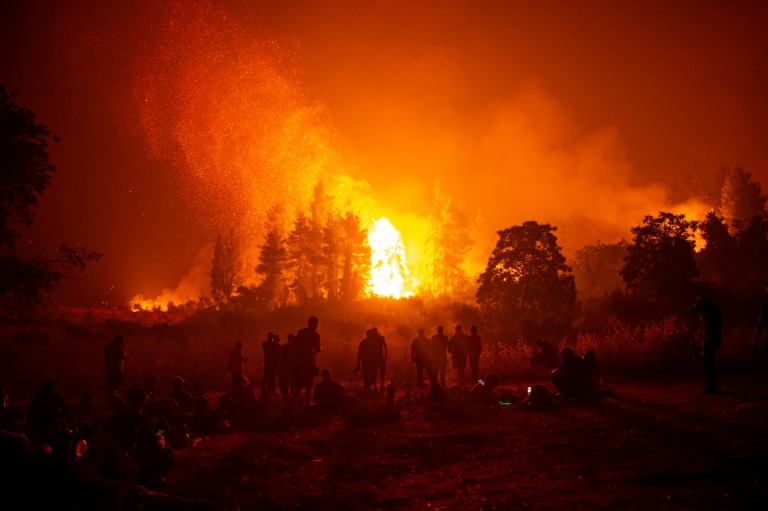Hundreds of firefighters battled Thursday to contain new flare-ups in wildfire-ravaged areas of Greece, where summer infernos have caused what the prime minister described as the country’s “greatest ecological disaster in decades”.
Rain overnight in some areas and falling temperatures appeared to have eased the situation after two weeks of devastating blazes, and Prime Minister Kyriakos Mitsotakis said “we can be more optimistic today.”
But weeks of scorching summer weather lie ahead.
Greece’s most severe heatwave in decades has fanned blazes that have destroyed more than 100,000 hectares of forests and farmland, the country’s worst wildfire damage since 2007, the European Forest Fire Information System said Thursday.
The fires have left three dead, hundreds homeless, forced thousands to flee, and caused economic and environmental devastation.
Greece is just one of a number of countries in the Mediterranean region that have been hit by a savage fire season which authorities have blamed on climate change.
Mitsotakis on Thursday described the “mega fires” as Greece’s “greatest ecological disaster in decades”.
“The climate crisis is here… and it tells us that everything must change,” he told reporters, pointing to other devastating fires in Turkey, Italy and Algeria.
“We managed to protect thousands of people. But we lost forests and properties,” he said, vowing to overhaul the country’s civil protection authority.
Mitsotakis said that 150 homes have been destroyed in greater Athens over the last week, while the count is ongoing on the island of Evia, which accounts for more than half of the area burned nationwide.
The PM has been placed on the defensive after his government as recently as June was assuring Greeks that the country was fully prepared to face the coming fire season.
But on Thursday he was forced to admit: “It seemed that this particular phenomenon exceeded our capabilities and the preparations put in place.”
Main opposition leader Alexis Tsipras argued that Mitsotakis had “failed to grasp the magnitude of the disaster…and the scope of his responsibilities.”
– ‘Can’t take it anymore’ –
A fire service official told AFP on Thursday that “the fire fronts are still active” on Evia and in the Arcadia region of the Peloponnese peninsula and “fires are constantly flaring up” in both areas.
In the north of Evia, where hundreds have been evacuated by boat, 858 firefighters including reinforcements from several European countries were battling the flames.
At the height of the fires in early August, the flames had reached the gates of Athens, filling the sky of the city of four million inhabitants with grey smoke.
But after weeks of punishing temperatures often well over 40 degrees Celsius (104 Fahrenheit), temperatures dropped on Thursday.
The falling temperatures and overnight rain in Evia, the Peloponnese and central Greece had helped improve the situation, said Stathis Koulis, the mayor of Gortynia.
The village in a mountainous area of Arcadia 200 kilometres (120 miles) west of Athens has become the primary focus in the Peloponnese, with deep ravines posing a challenge to firefighters.
Twenty villages have been evacuated in the area over the past few days and 680 firefighters, including more than a hundred sent to help from France, and five water-dropping aircraft have been relentlessly battling the flames.
On Evia island, meanwhile, locals have lost their livelihoods.
“I can’t take it anymore,” said farmer Kostis Angelou as he wandered between the corpses of his goats, all 372 of them burnt by a fire that devoured forests.
The 44-year-old managed to survive by spending hours under an irrigation water pipe, surrounded by flames.
“A saint saved me,” he said.
– Climate ‘code red’ –
The latest extreme weather events come after a “code red” report from the UN’s Intergovernmental Panel on Climate Change was published on Monday warning that the world is warming far faster than previously feared.
The Mediterranean has been singled out as a “climate change hotspot”, with increasing temperatures and aridity lengthening fire seasons, according to a draft IPCC assessment seen exclusively by AFP.
Algeria announced three days of national mourning starting Thursday for the 69 killed in blazes there.
In Italy, 48.8 degrees Celsius (119.8 Fahrenheit) was registered in Sicily on Wednesday — beating the previous high registered in Greece in 1977 in what is believed to be a new European record.
Eight people were killed in fires in Turkey’s south earlier in the month, while in the north the death toll rose to 11 on Thursday from flash floods that have swept across several Black Sea regions.









